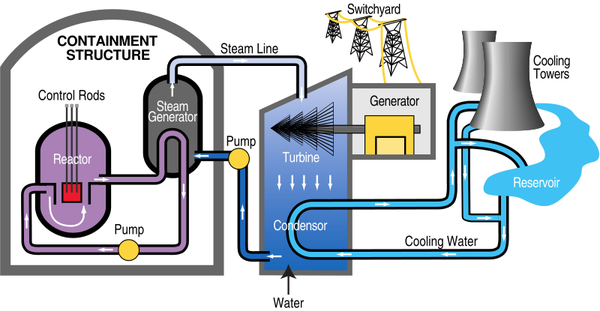Difference between revisions of "Nuclear Power"
(→About Nuclear Power) |
|||
| Line 30: | Line 30: | ||
*Difficult to safely dispose of nuclear waste. | *Difficult to safely dispose of nuclear waste. | ||
*There is a small risk of meltdown. | *There is a small risk of meltdown. | ||
| + | |||
| + | ==Key Stage 4== | ||
| + | ===Meaning=== | ||
| + | '''Nuclear Power''' is a method used to generate [[electricity]] using [[Nuclear Fuel|nuclear fuel]]. | ||
| + | |||
| + | ===About Nuclear Power=== | ||
| + | : [[Nuclear Fuel]] can be used to provide [[power]] by generating electricity that can be sent to houses and industry. | ||
| + | : [[Nuclear Fuel]] has [[energy]] in its [[Nuclear Potential Energy Store|nuclear potential energy store]] which can be easily transferred into its [[Thermal Energy Store|thermal energy store]]. | ||
| + | |||
| + | {| class="wikitable" | ||
| + | |- | ||
| + | |[[File:NuclearPowerStationDiagram.png|center|600px]] | ||
| + | |- | ||
| + | | style="height:20px; width:200px; text-align:center;" |A [[diagram]] of a [[coal]] [[Thermal Power Station|power station]]. | ||
| + | |} | ||
| + | : 1. [[Nuclear Fuel]] undergoes a [[Nuclear Reaction|nuclear reaction]] in the [[Reactor Core|reactor core]]. | ||
| + | : 2. Water in the [[Reactor Core|reactor core]] is heated and passed through a heat exchanger. | ||
| + | : 3. Water in the [[Reactor Core|reactor core]] becomes contaminated with [[radioactive]] [[material]] so the heat exchanger heats up uncontaminated water. | ||
| + | : 3. The uncontaminated water turns to steam and passes down pipes to turn a turbine. | ||
| + | : 4. The turbine causes a generator to spin. | ||
| + | : 5. The generator makes an electrical current. | ||
| + | |||
| + | ====Advantages==== | ||
| + | *Can work continuously. | ||
| + | *Power supply can be varied depending on demand. | ||
| + | *Few [[Thermal Power Station|power station]]s needed to supply a large number of houses. | ||
| + | *High energy density (1kg of Uranium can provide the same energy as 10,000kg of coal). | ||
| + | |||
| + | ====Disadvantages==== | ||
| + | *Cost of fuel. | ||
| + | *Difficult to safely dispose of nuclear waste. | ||
| + | *There is a small risk of meltdown. | ||
| + | |||
| + | ===Extra Information=== | ||
| + | {{#ev:youtube|https://www.youtube.com/watch?v=R7WPEYGr1Vs}} | ||
Revision as of 21:15, 19 April 2019
Contents
Key Stage 3
Meaning
Nuclear Power is a method used to generate electricity using nuclear fuel.
About Nuclear Power
- Nuclear Fuel can be used to provide power by generating electricity that can be sent to houses and industry.
- Nuclear Fuel has energy in its nuclear potential energy store which can be easily transferred into its thermal energy store.
| A diagram of a coal power station. |
- 1. Nuclear Fuel undergoes a nuclear reaction in the reactor core.
- 2. Water in the reactor core is heated and passed through a heat exchanger.
- 3. Water in the reactor core becomes contaminated with radioactive material so the heat exchanger heats up uncontaminated water.
- 3. The uncontaminated water turns to steam and passes down pipes to turn a turbine.
- 4. The turbine causes a generator to spin.
- 5. The generator makes an electrical current.
Advantages
- Can work continuously.
- Power supply can be varied depending on demand.
- Few power stations needed to supply a large number of houses.
- High energy density (1kg of Uranium can provide the same energy as 10,000kg of coal).
Disadvantages
- Cost of fuel.
- Difficult to safely dispose of nuclear waste.
- There is a small risk of meltdown.
Key Stage 4
Meaning
Nuclear Power is a method used to generate electricity using nuclear fuel.
About Nuclear Power
- Nuclear Fuel can be used to provide power by generating electricity that can be sent to houses and industry.
- Nuclear Fuel has energy in its nuclear potential energy store which can be easily transferred into its thermal energy store.
| A diagram of a coal power station. |
- 1. Nuclear Fuel undergoes a nuclear reaction in the reactor core.
- 2. Water in the reactor core is heated and passed through a heat exchanger.
- 3. Water in the reactor core becomes contaminated with radioactive material so the heat exchanger heats up uncontaminated water.
- 3. The uncontaminated water turns to steam and passes down pipes to turn a turbine.
- 4. The turbine causes a generator to spin.
- 5. The generator makes an electrical current.
Advantages
- Can work continuously.
- Power supply can be varied depending on demand.
- Few power stations needed to supply a large number of houses.
- High energy density (1kg of Uranium can provide the same energy as 10,000kg of coal).
Disadvantages
- Cost of fuel.
- Difficult to safely dispose of nuclear waste.
- There is a small risk of meltdown.
